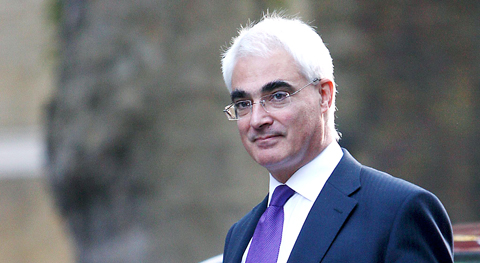Britain’s government yesterday announced a part-nationalization of the country’s eight main banks with a bailout worth up to£50 billion (US$87 billion).
The package also includes a £200 billion credit line for banks including Royal Bank of Scotland, HSBC and Barclays, the Treasury said in a statement.
The government said it would use up to £50 billion of taxpayers’ money to buy major stakes in the banks, which also include HBOS, Lloyds TSB, Standard Chartered, Abbey and Nationwide Building Society.

PHOTO: EPA
“Following discussions convened by HM Treasury ... major UK banks and the largest building society have confirmed their participation in a government-supported recapitalization scheme,” the statement said.
Finance minister Alistair Darling said that the move his Labour government was making was a bold measure in response to “extraordinary times.”
“The taxpayers’ interest is being protected. I’m very clear that in return for all this, the taxpayer has got to see some upside,” he told Sky News:
Chancellor of the Exchequer Darling said he still did not “rule anything out” but he said the bailout package “will go a long way.”
He denied that he had dithered, which critics say caused bank shares to plunge in London trading since Monday amid uncertainty over the government’s intentions.
“I wanted to announce it when the time was right, when we had got everything sorted out, we had a scheme that worked and the big banks were signed up to it,” he said.
“And we actually finished these discussions only a few hours ago.”
Shares in RBS, Barclays and Lloyds TSB had plummeted in trading on Tuesday.
RBS, which owns NatWest, was worst-hit, plunging more than 39 percent, while Barclays was down just over 9 percent and Lloyds TSB fell almost 13 percent.
Tuesday’s losses took the collapse in RBS’ stock to about 80 percent in the year since the credit crunch began with the collapse of the US subprime loan market.
Just 12 months ago, RBS was riding high, leading a consortium in an attempted US$100 billion takeover of Dutch bank ABN Amro.
London’s FTSE 100 index of top shares fell 1.64 percent to 4,529.64 points at the start of trading yesterday immediately after the announcement of the rescue plan.
Britain has fully nationalized two British banks since the credit crunch began a year ago — Bradford and Bingley and Northern Rock.

MORE VISITORS: The Tourism Administration said that it is seeing positive prospects in its efforts to expand the tourism market in North America and Europe Taiwan has been ranked as the cheapest place in the world to travel to this year, based on a list recommended by NerdWallet. The San Francisco-based personal finance company said that Taiwan topped the list of 16 nations it chose for budget travelers because US tourists do not need visas and travelers can easily have a good meal for less than US$10. A bus ride in Taipei costs just under US$0.50, while subway rides start at US$0.60, the firm said, adding that public transportation in Taiwan is easy to navigate. The firm also called Taiwan a “food lover’s paradise,” citing inexpensive breakfast stalls

TRADE: A mandatory declaration of origin for manufactured goods bound for the US is to take effect on May 7 to block China from exploiting Taiwan’s trade channels All products manufactured in Taiwan and exported to the US must include a signed declaration of origin starting on May 7, the Bureau of Foreign Trade announced yesterday. US President Donald Trump on April 2 imposed a 32 percent tariff on imports from Taiwan, but one week later announced a 90-day pause on its implementation. However, a universal 10 percent tariff was immediately applied to most imports from around the world. On April 12, the Trump administration further exempted computers, smartphones and semiconductors from the new tariffs. In response, President William Lai’s (賴清德) administration has introduced a series of countermeasures to support affected

CROSS-STRAIT: The vast majority of Taiwanese support maintaining the ‘status quo,’ while concern is rising about Beijing’s influence operations More than eight out of 10 Taiwanese reject Beijing’s “one country, two systems” framework for cross-strait relations, according to a survey released by the Mainland Affairs Council (MAC) on Thursday. The MAC’s latest quarterly survey found that 84.4 percent of respondents opposed Beijing’s “one country, two systems” formula for handling cross-strait relations — a figure consistent with past polling. Over the past three years, opposition to the framework has remained high, ranging from a low of 83.6 percent in April 2023 to a peak of 89.6 percent in April last year. In the most recent poll, 82.5 percent also rejected China’s

PLUGGING HOLES: The amendments would bring the legislation in line with systems found in other countries such as Japan and the US, Legislator Chen Kuan-ting said Democratic Progressive Party (DPP) Legislator Chen Kuan-ting (陳冠廷) has proposed amending national security legislation amid a spate of espionage cases. Potential gaps in security vetting procedures for personnel with access to sensitive information prompted him to propose the amendments, which would introduce changes to Article 14 of the Classified National Security Information Protection Act (國家機密保護法), Chen said yesterday. The proposal, which aims to enhance interagency vetting procedures and reduce the risk of classified information leaks, would establish a comprehensive security clearance system in Taiwan, he said. The amendment would require character and loyalty checks for civil servants and intelligence personnel prior to